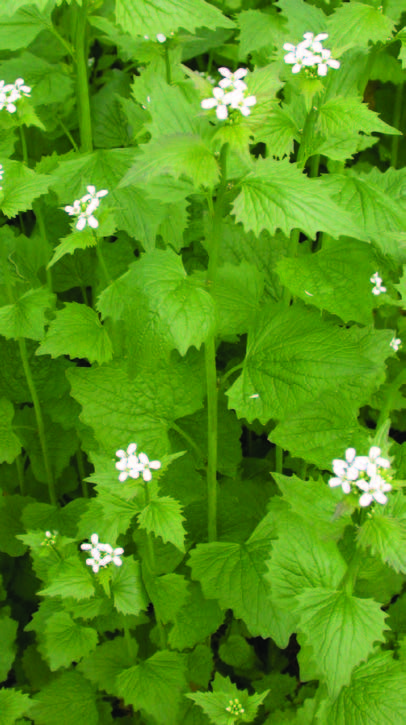 On Tuesday, 31 August, we welcomed Sherry Shrubb as our Guest Speaker. Via Zoom, she helped us to learn more about how we can help pollinators and help food security in our community; all in our own backyard.
On Tuesday, 31 August, we welcomed Sherry Shrubb as our Guest Speaker. Via Zoom, she helped us to learn more about how we can help pollinators and help food security in our community; all in our own backyard.In particular, she described the challenges associated with the promotion of native species and the need to control invasive species plants (eg garlic mustard - see side photo) so prevalent in our backyards and neighbourhoods.
Sherry noted the value in citizens joining into the David Suzuki Foundation Butterfly Project if they were looking for an entrance-way to help
Following many questions from our more-than-interested Club members (go to the Read more ... tab for a variety of responses), Mary Mercato thanked Sherry for her presentation and the passion with which she was pursuing this important initiative. She also noted that we had contributed funds in Sherry's name, to our Operation EyeSight project; this to restore the vision of a senior in India.
Regarding lists for local native and invasive plants:
The provincial list is being updated and should be released soon, in the meantime Credit Valley Conservation Authority has a good list:
https://cvc.ca/wp-content/uploads//2021/07/InvasivePlantsList.pdf
The Ontario Invasive Plant Council has produced a number of excellent management factsheets for a variety of the worst offenders: https://www.ontarioinvasiveplants.ca/resources/best-management-practices/
They have also created Grow me Instead brochures https://www.ontarioinvasiveplants.ca/resources/grow-me-instead/
The Regional Invasive Species & Climate Change Management Challenge (RISCC) Gardening with climate-smart native plants in the Northeast is helpful brochure: https://scholarworks.umass.edu/cgi/viewcontent.cgi?article=1007&context=eco_ed_materials
South Western Ontario is dealing with a larger influx of plants from south of the border. Plant Invaders of Mid-Atlantic Natural Areas U.S. Fish and Wildlife Service is a good reference: https://www.invasive.org/eastern/midatlantic/
Prioritizing range-shifting invasive plants High-impact species coming to the Northeast https://scholarworks.umass.edu/cgi/viewcontent.cgi?article=1006&context=eco_ed_materials
Here are some lesser known invasive plant species on the Canadian Food Inspection list of Invasive plants: fact sheets. These are plants that have potential for great damage and potential sightings of these species should be reported to CFIA https://inspection.canada.ca/plant-health/invasive-species/invasive-plants/fact-sheets/eng/1331614724083/1331614823132
The provincial list is being updated and should be released soon, in the meantime Credit Valley Conservation Authority has a good list:
https://cvc.ca/wp-content/uploads//2021/07/InvasivePlantsList.pdf
The Ontario Invasive Plant Council has produced a number of excellent management factsheets for a variety of the worst offenders: https://www.ontarioinvasiveplants.ca/resources/best-management-practices/
They have also created Grow me Instead brochures https://www.ontarioinvasiveplants.ca/resources/grow-me-instead/
The Regional Invasive Species & Climate Change Management Challenge (RISCC) Gardening with climate-smart native plants in the Northeast is helpful brochure: https://scholarworks.umass.edu/cgi/viewcontent.cgi?article=1007&context=eco_ed_materials
South Western Ontario is dealing with a larger influx of plants from south of the border. Plant Invaders of Mid-Atlantic Natural Areas U.S. Fish and Wildlife Service is a good reference: https://www.invasive.org/eastern/midatlantic/
Prioritizing range-shifting invasive plants High-impact species coming to the Northeast https://scholarworks.umass.edu/cgi/viewcontent.cgi?article=1006&context=eco_ed_materials
Here are some lesser known invasive plant species on the Canadian Food Inspection list of Invasive plants: fact sheets. These are plants that have potential for great damage and potential sightings of these species should be reported to CFIA https://inspection.canada.ca/plant-health/invasive-species/invasive-plants/fact-sheets/eng/1331614724083/1331614823132


